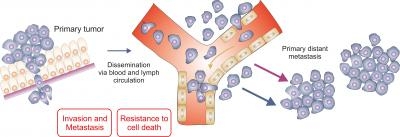
Leiden researchers discover genes that affect spread of breast cancer
Researchers at Leiden University have mapped genes that cause breast cancer cells to migrate. The Leiden toxicologists Professor Bob van de Water, Dr Wies van Roosmalen, Dr Sylvia E. Le Dévédec and colleagues studied 1500 individual genes. They found eight, including the SRPK1 gene, that regulate the migration of tumour cells and correlate with disease outcome of breast cancer patients. Their findings are published in the Journal of Clinical Investigation.

Increased chance of cell migration
'In principle, every cell has these genes,' Van de Water explains. ‘They always have a different degree of expression, with some being more strongly present in tumour cells than others. We found that in particular the presence of SRPK1 is closely linked to the potential of breast tumour cells to migrate. This finding offers a starting point for developing cancer medications that can prevent cells from invading their surroundings and ultimately spreading to distant organs.'
Cells escape from the primary tumour
These eight genes were shown to control cell migration, which is one of the causes of metastasis. Aggressive tumour cells have the capacity to invade the tumour environment and target other parts of the body. 'The tumour cells migrate away from the primary tumour,' Van de Water comments. 'If the genes are expressed at a high level, the tumour cells become more motile, which in turn increases metastasis.'

New generations of medicines that combat metastasis
‘The genes we have identified encode for druggable molecules known as kinases,' Van de Water explains. 'Kinases regulate the migration of tumour cells by controlling the dynamics of what might be called the 'feet' of the cells. These little feet allow them to be motile and spread to other parts of the body. We are hoping to develop new compounds that can inhibit these kinases, and reduce the chance of metastasis. Preventing metastases and killing tumour cells at the secondary sites is crucial for treating cancer.'
(18 March 2015)
Read more
Article: Tumor cell migration screen identifies SRPK1 as breast cancer metastasis determinant
